
The 278th Armored Cavalry Regiment, previously the 117th Infantry Regiment, is an armored brigade combat team of the Tennessee Army National Guard with headquarters in Knoxville, Tennessee. It is the only National Guard Armored Cavalry Regiment and one of only two in the entire US Army order of battle, the other being the active duty 11th ACR. The unit traces its lineage from the volunteer militias of Eastern Tennessee and has participated in conflicts from the Revolutionary War to the Global War on Terror.

The 35th Infantry Division, formerly known as the 35th Division, is an infantry formation of the United States Army National Guard headquartered at Fort Leavenworth, Kansas.

The Missouri National Guard (MONG), commonly known as the Missouri Guard, is a component of the Army National Guard and Missouri State Department of the National Guard. It is composed of Army and Air National Guard units. The Department office is located in Jefferson City.
The United States Army Regimental System (USARS) is an organizational and classification system used by the United States Army. It was established in 1981 to replace the Combat Arms Regimental System (CARS) to provide each soldier with continuous identification with a single regiment, and to increase a soldier's probability of serving recurring assignments with their regiment. The USARS was intended to enhance combat effectiveness by providing the opportunity for a regimental affiliation, thus obtaining some of the benefits of the traditional regimental system.
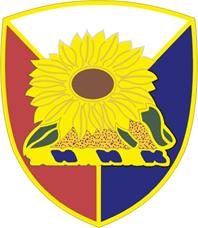
The Kansas Army National Guard is a component of the Army National Guard and the Kansas National Guard. Kansas Army National Guard units are trained and equipped as part of the United States Army. The same ranks and insignia are used and National Guardsmen are eligible to receive all United States military awards. The Kansas Guard also bestows a number of state awards for local services rendered in or to the state of Kansas. It is, along with the Kansas Air National Guard, an element of the Kansas National Guard.
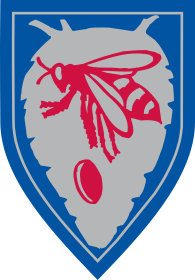
The North Carolina Army National Guard (NCARNG) is North Carolina's principal military force. The force is equipped by the federal government and jointly maintained subject to the call of either. The professional head of the North Carolina Army National Guard is the Adjutant General.
The 120th Infantry Regiment is an infantry regiment of the United States Army National Guard.
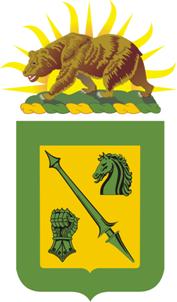
The 18th Cavalry Regiment is a parent cavalry regiment of the United States Army.

The 252nd Armor Regiment is an armored regiment of the North Carolina Army National Guard, part of the 30th Armored Brigade Combat Team, which in turn is part of the 29th Infantry Division.
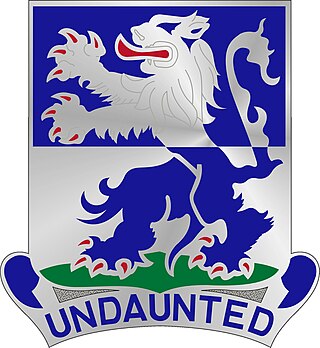
The 119th Infantry Regiment was an infantry regiment of the United States Army. The unit was an organic element of the 30th Infantry Division of the United States Army.
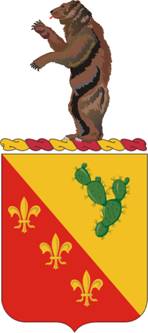
The 129th Field Artillery Regiment is a regiment of the Field Artillery Branch of the United States Army, part of the Missouri Army National Guard. The 1st Battalion is the only active unit of the regiment, with the battalion Headquarters and Headquarters Battery in Maryville, Battery A in Albany, Battery B in Chillicothe, and Battery D in Independence. The battalion is a subordinate unit of the 130th Field Artillery Brigade, headquartered in Manhattan, Kansas.

The 168th Field Artillery Regiment was a Field Artillery Branch regiment of the Army National Guard.
The 203rd Engineer Battalion is a combat engineer battalion of the Missouri Army National Guard.
The 138th Infantry Regiment is an light infantry regiment of the United States Army and the Missouri National Guard.
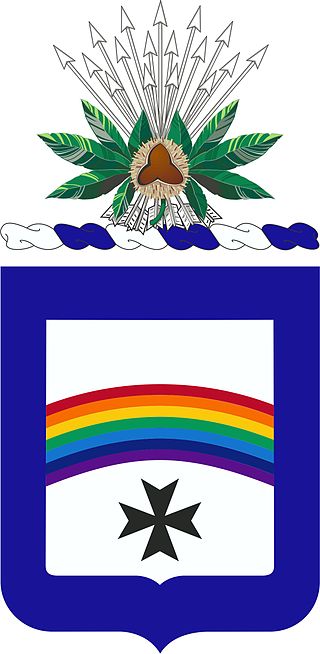
The 166th Infantry Regiment was an infantry regiment of the United States Army. It was part of the Ohio National Guard. In 1992, the regiment was consolidated with the 148th Infantry Regiment.

The 137th Infantry Regiment was an infantry regiment of the United States Army. It was part of the Kansas Army National Guard and has served with distinction in the Philippine Insurrection, World War I, and World War II. The last active battalion was the 2nd Battalion, as the 2–137th Combined Arms Battalion, a component of the 635th Regional Support Group. The battalion was redesignated as the 1st Battalion, 635th Armor Regiment in 2020, although the structure of the unit remained unchanged.
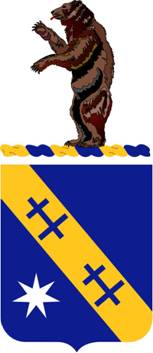
The 140th Infantry Regiment was an infantry formation of the Missouri National Guard.

The 195th Infantry Regiment was a regiment of the United States Army, part of the New Hampshire Army National Guard.

The 218th Infantry Regiment (First South Carolina) was an infantry regiment of the United States Army National Guard, active between 1947 and 1959. Since 1997, the 218th Regiment has been the Regional Training institute of the South Carolina Army National Guard.
















